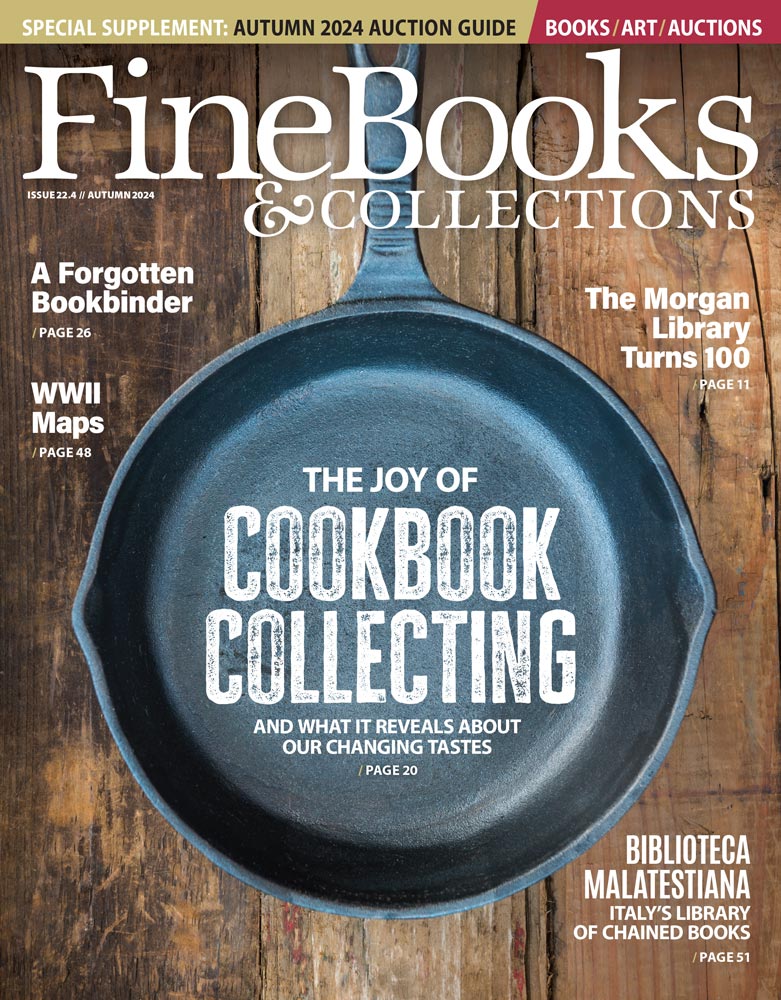October 2012 |
Honey & Wax Booksellers
Catalogue Review: Honey & Wax No. 1
 In his 84th "Moral Letter", the philosopher Seneca wrote to his friend Lucilius one of the earliest, most in-depth descriptions of why we should use books as bees use flowers:
In his 84th "Moral Letter", the philosopher Seneca wrote to his friend Lucilius one of the earliest, most in-depth descriptions of why we should use books as bees use flowers:
Nearly 2,000 years later, it's wonderful to see Heather O'Donnell continuing the tradition and invoking the bee in bold from cover to cover of Honey & Wax Bookseller's Catalogue Number 1. The selection of 80 "books with a social life and a secret past" are books that have already been used by bees. Highlights include a copy of Marianne Moore's Tell Me, Tell Me with an off-the-cuff poem inscribed by the author to a friend and Frank O'Hara's copy of Locus Solus I. Social life can span decades as with Graham Greene's marked up copy of the letters of George Elliot. Speaking of nourishing the mind: there are guaranteed recipes for sweet honey across the centuries: Shakespeare, Milton, Johnson. Finally, a personal favorite showcases famous bibliophiles: Katherine Burton and Louise S.G. Perry's Bibliolatrous Series of 8 short biographies on book lovers from de Bury to Folger.
Catalogue Honey & Wax No. 1 is a wonderful contribution to the latter-day history of bee-like reading for two reasons: the scholarship behind the books for sale, and the self-awareness of the whole thing. O'Donnell writes that nowadays, books offer us a choice, the choice "to give each other something lasting, rather than simply clicking 'share'." The catalogue descriptions tell us how to use books, as gifts, as notepads, as relics. We may not know what a social history of Twitter will look like, but for those who make the choice to commit to "books with no downloadable equivalent" there is a more certain future. We know what these books look and feel like. The future's a beautiful thing.
 In his 84th "Moral Letter", the philosopher Seneca wrote to his friend Lucilius one of the earliest, most in-depth descriptions of why we should use books as bees use flowers:
In his 84th "Moral Letter", the philosopher Seneca wrote to his friend Lucilius one of the earliest, most in-depth descriptions of why we should use books as bees use flowers:We should imitate the bees, as they say, which wander and pluck suitable flowers to make honey, then carry whatever, they arrange and distribute through the honeycomb...[W]e should imitate these bees and also separate whatever we have collected from different readings (for things that are separated are preserved better), then to combine with the care and ability of our mind having been applied these various offerings into one flavor, so that even now if it is apparent from where it was acquired, yet it is apparent that it is something other than from where it came.For Seneca it was all a question of putting good reading to good use, literally extracting nourishing ideas from books that he read and copying them into a notebook. He recognized that we are a sum of parts, and attempted to read books in a way that would formally recognize the influential hodge-podge, the "many plots in one." He wanted to read viscerally, he wanted to feel like he was taking something of the book with him, digesting it. Invoking the labors of the bee was one simple, elegant shorthand for invoking the complex art of remembering.
Nearly 2,000 years later, it's wonderful to see Heather O'Donnell continuing the tradition and invoking the bee in bold from cover to cover of Honey & Wax Bookseller's Catalogue Number 1. The selection of 80 "books with a social life and a secret past" are books that have already been used by bees. Highlights include a copy of Marianne Moore's Tell Me, Tell Me with an off-the-cuff poem inscribed by the author to a friend and Frank O'Hara's copy of Locus Solus I. Social life can span decades as with Graham Greene's marked up copy of the letters of George Elliot. Speaking of nourishing the mind: there are guaranteed recipes for sweet honey across the centuries: Shakespeare, Milton, Johnson. Finally, a personal favorite showcases famous bibliophiles: Katherine Burton and Louise S.G. Perry's Bibliolatrous Series of 8 short biographies on book lovers from de Bury to Folger.
Catalogue Honey & Wax No. 1 is a wonderful contribution to the latter-day history of bee-like reading for two reasons: the scholarship behind the books for sale, and the self-awareness of the whole thing. O'Donnell writes that nowadays, books offer us a choice, the choice "to give each other something lasting, rather than simply clicking 'share'." The catalogue descriptions tell us how to use books, as gifts, as notepads, as relics. We may not know what a social history of Twitter will look like, but for those who make the choice to commit to "books with no downloadable equivalent" there is a more certain future. We know what these books look and feel like. The future's a beautiful thing.














